If your motorcycle won't start, you're likely facing one of several common issues that can be easily overlooked. You might think it's just a dead battery or a fuel problem, but there's more to it than that. From ignition system failures to unnoticed electrical connection issues, each potential culprit deserves your attention. Before you jump to conclusions, consider some less obvious factors, like the kickstand position or even a malfunctioning security system. Understanding these elements could save you time and frustration, but you'll need to know where to begin to pinpoint the real issue.
Key Takeaways
- Check battery connections for corrosion or looseness; a healthy battery should read at least 12.6 volts for proper starting.
- Inspect the fuel system for clogs or a malfunctioning fuel pump, which can prevent fuel delivery to the engine.
- Examine the ignition system, including spark plugs and ignition coils, to ensure they are functioning properly and providing a spark.
- Verify the kickstand and neutral switch are correctly positioned; misalignment can activate safety mechanisms preventing the bike from starting.
Battery Issues
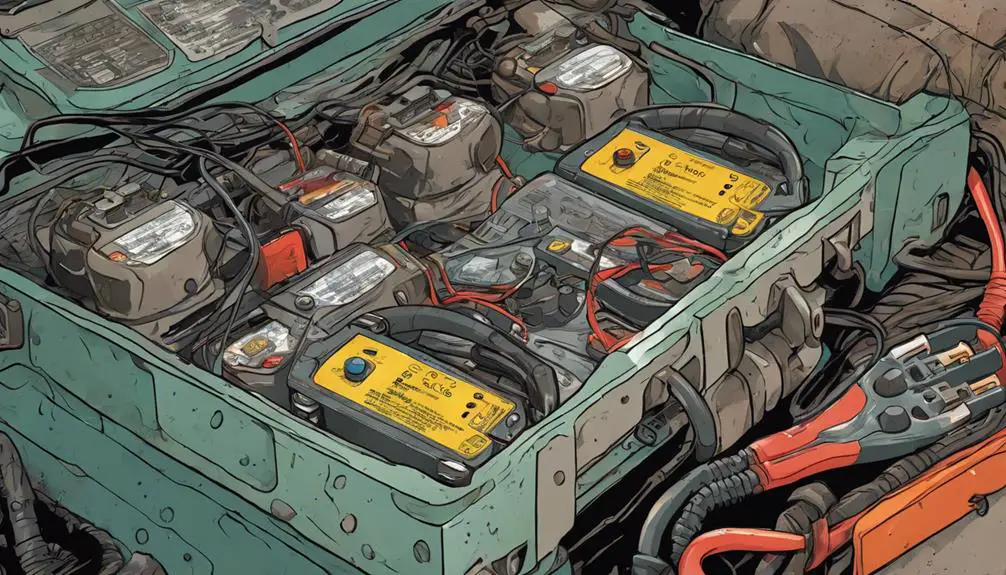
When your motorcycle won't start, one of the first things you should check is the battery, as it's often the culprit behind starting issues.
Start by inspecting the battery terminals; if they're dirty or corroded, clean them with a wire brush. A secure connection is essential for the flow of energy. If the battery's charge is low, you can jump-start it using jumper cables and another vehicle. Alternatively, you might want to invest in a battery charger.
If your battery's old, it might be time for a replacement. Most batteries last three to five years, so if yours is pushing that limit, consider getting a new one.
You can also test the voltage with a multimeter; a healthy battery should read about 12.6 volts or more.
Fuel System Problems
Fuel system problems can prevent your motorcycle from starting, so it's crucial to check for issues like clogged fuel lines or a faulty fuel pump. If you're feeling the urge to ride and your bike won't cooperate, start by inspecting the fuel lines. Dirt, debris, or even stale fuel can create blockages that starve your engine of the energy it craves.
Next, examine your fuel pump. If it's not delivering fuel to the engine, you won't get far, no matter how much you twist the throttle. Listen for any sounds when you turn the ignition; a humming noise indicates the pump is working. If it's silent, you might need to replace it.
Also, don't overlook the fuel filter. A clogged filter can choke your bike's performance and lead to starting issues. Be proactive—replace it if it looks dirty or hasn't been changed in a while.
Ignition System Failure
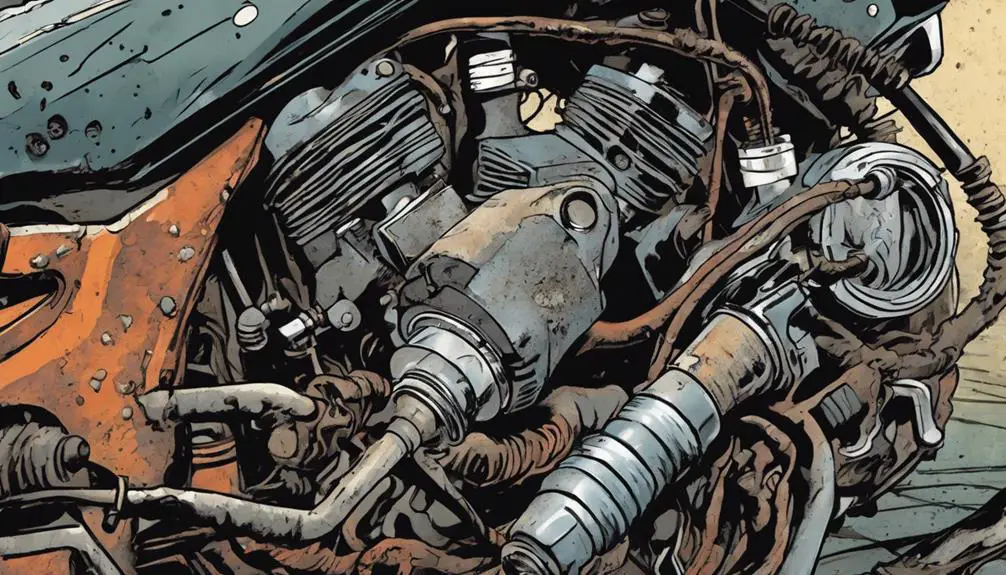
When your motorcycle won't start, it could be due to ignition system failure.
You might've faulty spark plugs or ignition coil problems that prevent the engine from firing.
Let's explore how these issues can affect your ride.
Faulty Spark Plugs
Faulty spark plugs can lead to ignition system failure, making your motorcycle hard to start or causing it to run poorly. If you're facing inconsistent performance, it's essential to check your spark plugs. They play an important role in igniting the air-fuel mixture in your engine. When they wear out or get fouled, you might experience issues that can leave you stranded.
Look for these signs of faulty spark plugs:
- Hard starting: If your bike struggles to start, it could be a sign your spark plugs need attention.
- Rough idling: An uneven idle can indicate that the spark plugs aren't firing efficiently.
Don't let faulty spark plugs keep you from hitting the open road. Inspect them regularly and replace them as needed. A smooth ride is all about keeping your ignition system in top shape.
Ignition Coil Problems
Ignition coil problems can throw a wrench in your motorcycle's starting system, leaving you frustrated and stranded. These coils are essential components that transform battery voltage into the high voltage needed to ignite your fuel-air mixture. When they fail, you might notice symptoms like weak sparks or none at all, making your bike stubbornly refuse to start.
To diagnose ignition coil issues, start by checking for visible signs of wear or damage. Look for cracks, corrosion, or loose connections; these can compromise performance. If everything looks good, test the coil with a multimeter. This tool can help you measure resistance levels, allowing you to determine if the coil's functioning within specifications.
If you find a faulty ignition coil, replacing it is usually straightforward. You'll often just need basic tools and a bit of patience. Once you've swapped it out, your motorcycle should roar back to life, granting you the freedom to hit the open road again.
Don't let ignition coil problems hold you back; tackle them head-on and reclaim your ride!
Starter Motor Malfunction
If you're struggling to start your motorcycle, the starter motor might be the culprit.
Check the electrical connections and make certain your battery's in good condition, as these factors can greatly affect performance.
Don't overlook the starter relay either; it could be the missing piece in your starting puzzle.
Electrical Connection Issues
Electrical connection problems can lead to a frustrating starter motor malfunction, preventing your motorcycle from starting smoothly. When you press that ignition button, you expect a roar, not a whimper. If your bike's not responding, it might be time to check your electrical connections.
Here are a few things to take into account:
- Loose or corroded wires: Over time, vibration and exposure to the elements can wear down your connections. A loose wire can disrupt the flow of electricity.
- Bad connectors: Sometimes, connectors can become damaged. Inspect them closely for any signs of wear or breakage.
Battery Condition Check
A weak or dead battery can be the culprit behind your motorcycle's starting troubles, so checking its condition is essential.
Start by inspecting the battery terminals for corrosion or loose connections. Clean any buildup you find, as even a small amount can disrupt the flow of electricity.
Next, use a multimeter to test the voltage. A healthy battery should read around 12.6 volts when fully charged. If it's below 12.4 volts, your battery might need a recharge.
Don't forget to check the age of your battery, too. If it's over three to five years old, it could be nearing the end of its life.
If your battery's condition is suspect, try jump-starting it. If your bike roars to life, that's a clear sign your battery may need replacement.
Starter Relay Problems
Starter relay issues can prevent your motorcycle from starting, leaving you stranded and frustrated. The starter relay acts as a switch, allowing current to flow from the battery to the starter motor. When it malfunctions, your bike won't start, and you might hear nothing at all or just a click.
Here are some signs your starter relay might be the culprit:
- No response when you press the starter button: If you feel hopeless, this could indicate a failed relay.
- Intermittent starting issues: If your bike starts sometimes and not others, your relay might be on its last legs.
To liberate yourself from this frustration, you'll want to test the relay. Use a multimeter to check for continuity. If it's faulty, replacing it is often a straightforward fix that gets you back on the road.
Embrace the freedom of the ride, and don't let a small component hold you back!
Electrical Connections Check
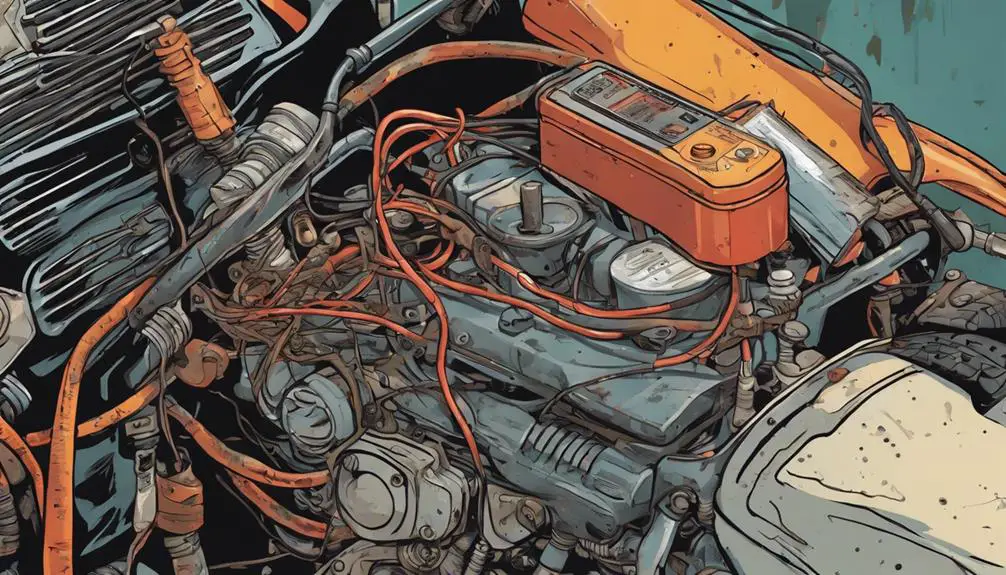
Checking the electrical connections is essential for diagnosing starting issues with your motorcycle. Your bike's electrical system relies on a network of connections to deliver power where it's needed.
Start by inspecting the battery terminals. Make sure they're clean and tight. Corrosion can build up, leading to poor connectivity, so a quick scrub with a wire brush can work wonders.
Next, trace the wiring harnesses for any signs of wear or damage. Look for frayed wires, loose connectors, or anything that might disrupt the flow of electricity. If you spot a broken connection, it's critical to repair it; even a tiny break can prevent your bike from starting.
Don't forget the ignition switch and relays. These components can be hidden, but they're essential for enabling the power to flow to the starter. A faulty ignition switch can leave you stranded, so give it a thorough check.
Kickstand and Neutral Switch
Inspecting the kickstand and neutral switch can reveal issues that prevent your motorcycle from starting, as these components play a vital role in the safety and functionality of your bike. If either the kickstand isn't fully up or the bike isn't in neutral, you're not going anywhere.
Here's what to check:
- Kickstand Position: Verify the kickstand is fully retracted. A misaligned or malfunctioning kickstand can trigger the safety switch, stopping your bike from starting.
- Neutral Gear: Confirm that your bike is in neutral. If the neutral light isn't illuminated, it could be a sign that the switch is faulty or the bike is still in gear.
Security System Interference
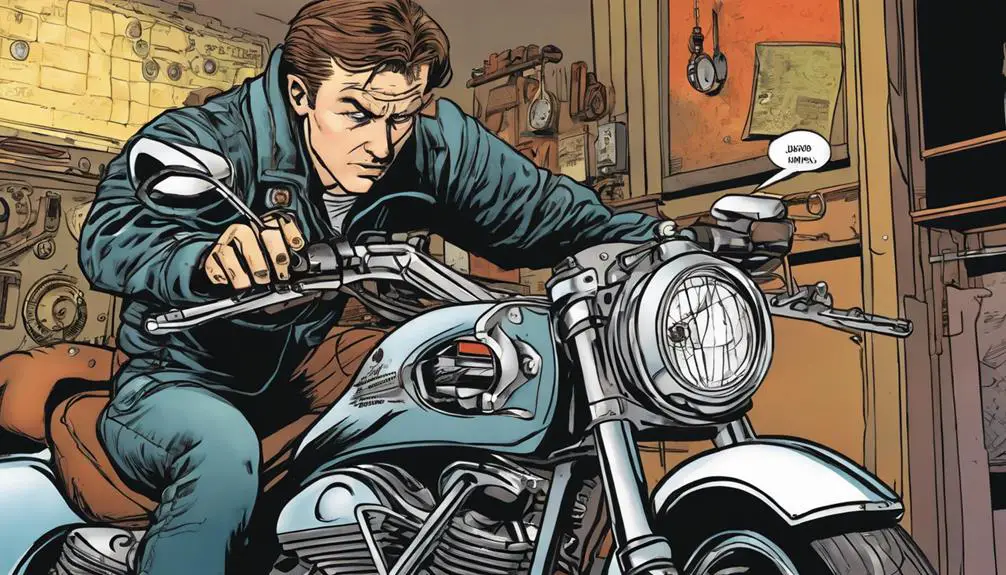
Sometimes, your motorcycle's security system can inadvertently prevent it from starting, especially if it's triggered or malfunctioning. You might find yourself ready to hit the open road, only to be met with silence when you hit the starter. This can be frustrating, but understanding how these systems work can help you regain control.
Check if your security features are activated. Many systems use a key fob or a code that you need to input before the motorcycle will start. If you've recently changed your keys or fob batteries, it's worth double-checking that they're functioning correctly. A simple reset of the system can also work wonders; consult your owner's manual for specific instructions.
Sometimes, environmental factors like moisture or dirt can interfere with the sensors. Giving your motorcycle a good clean can eliminate these issues. If you suspect a malfunction, it's wise to consult a professional rather than risking further damage.
Engine Oil Levels
Maintaining the right engine oil levels is essential for keeping your motorcycle running smoothly and efficiently. When your oil's too low, it can lead to serious engine problems, making it harder for you to release the freedom of the open road. Regularly checking and topping off your oil can prevent frustrating starts and keep your ride in peak condition.
Here are a few key points to remember:
- Check oil levels often: Make it a habit to check your oil before every ride. This simple step can save you from bigger issues down the line.
- Use the right oil: Different bikes require different types of oil. Consult your owner's manual to guarantee you're using the right one for your machine.
Diagnostic Tools and Methods
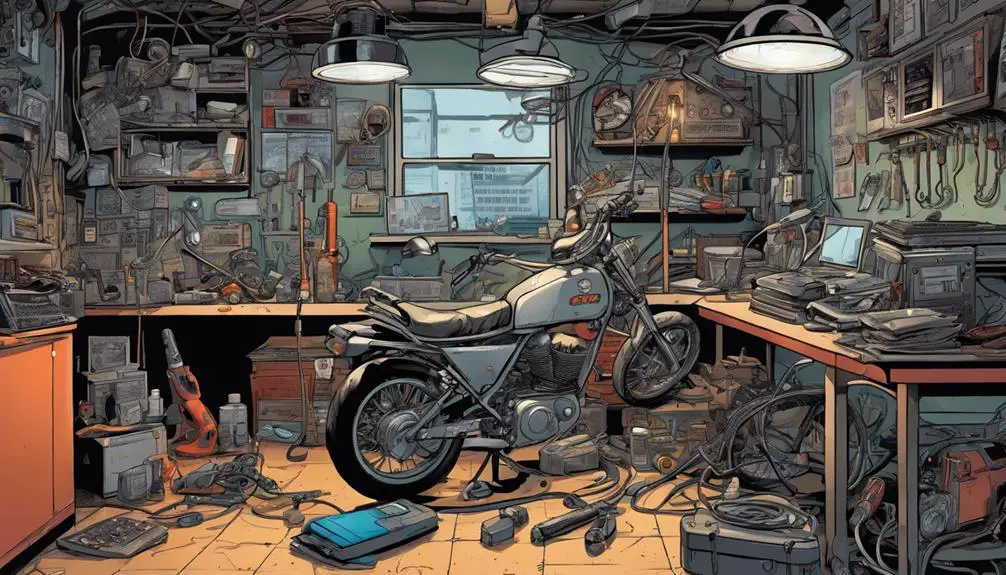
Having the right diagnostic tools and methods can make troubleshooting your motorcycle's starting issues much easier and more effective.
First, invest in a multimeter to check your battery voltage and ascertain it's delivering enough power. You'll want to see at least 12.6 volts for a fully charged battery. If it's low, charge it or replace it.
Next, grab a spark tester to check if your spark plugs are firing. Remove the plugs, connect the tester, and crank the engine. If you see a spark, your ignition system's likely fine. If not, you may need to examine the ignition coil or wiring.
Don't forget a fuel pressure gauge to ascertain your fuel system's functioning properly. Attach it to the fuel line and check for pressure; it should match your manufacturer's specifications. If it's low, inspect the fuel pump and filter.
Lastly, consider a motorcycle diagnostic scanner. This tool can read error codes from your bike's ECU, giving you a clearer picture of potential electronic issues.
Frequently Asked Questions
How Can Weather Affect My Motorcycle's Starting Ability?
Weather can greatly affect your motorcycle's starting ability.
Cold temperatures can thicken engine oil and weaken your battery, making it harder for the engine to turn over.
High humidity can lead to moisture buildup, causing electrical issues.
Rain or snow can also dampen ignition components, leading to poor spark.
To keep your bike running smoothly, consider using a battery maintainer and make certain your bike's components are dry and well-protected from the elements.
Can a Dirty Air Filter Prevent My Motorcycle From Starting?
Absolutely, a dirty air filter can prevent your motorcycle from starting. It restricts airflow, making it tough for the engine to get the air it needs to combust fuel efficiently.
When you're ready to hit the open road, guarantee your air filter's clean and free of debris. Regular maintenance can keep your ride smooth and your adventures alive.
Don't let a clogged filter hold you back from your freedom!
Is It Normal for Motorcycles to Have Starting Issues After Winter Storage?
Oh sure, your motorcycle just loves playing hide-and-seek after winter storage!
It's completely normal for bikes to have starting issues after hibernation. Cold weather can thicken fluids, drain batteries, and create a cozy home for moisture in the fuel system.
How Often Should I Check My Motorcycle's Spark Plugs?
You should check your motorcycle's spark plugs at least once a season or every 2,000 to 3,000 miles.
Regular inspections keep your engine running smoothly and help you avoid performance issues.
If you notice any signs of wear, like carbon buildup or corrosion, it's time to replace them.
Staying proactive with maintenance not only enhances your ride but also gives you peace of mind on the road.
Enjoy the freedom of the ride!
What Should I Do if My Motorcycle Makes Clicking Sounds but Won't Start?
If your motorcycle's making clicking sounds but won't start, it's time to investigate.
Start by checking your battery; it might be low or dead. Verify the connections are clean and tight.
If that's not the issue, look at the starter relay and fuses.
Sometimes, a faulty ignition switch can cause this problem too.
Don't hesitate to reach out to a mechanic if you're unsure.
Your ride deserves to roar back to life!
Conclusion
Troubleshooting your motorcycle's starting issues can feel like maneuvering through a maze, but with patience and a systematic approach, you'll find your way to the solution.
By checking the battery, fuel system, and ignition components, you can pinpoint the problem. Don't overlook the kickstand or any pesky security systems that might be causing trouble.
Regular maintenance keeps your bike running smoothly, ensuring you're back on the road, enjoying the ride in no time!